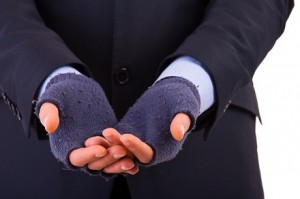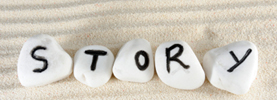Yes, you read that headline correctly. And, yes, one of my favorite cities – Portland, Maine – is trying its very best to sweep the down and out under the rug. The Portland City Council has banned standing, sitting, parking, or driving on a median in response to the outrage expressed by the good people of Portland. Their outrage was sparked by panhandlers – the homeless and poor who had staked out territory and asked for money at intersections throughout the city.
Were the people of Portland outraged that:
Their friends and neighbors have no job prospects?
Their friends and neighbors are asking for help as a last resort?
Their friends and neighbors have nowhere else to turn?
Sadly, I’m afraid not. You see: 
It’s not good for tourism to have those pesky panhandlers at every intersection of the city.
It’s uncomfortable for those of us who have a place to rest our heads every night to look those who don’t in the eye.
It’s unnerving to be reminded that so many people consider having three square meals every day an unattainable goal.
Having homeless people in the city isn’t a new concept to Portland’s elected officials. Last December at a presentation hosted by the Institute for Civic Leadership, Mark Swann of Preble Street Resource Center and Suzanne McCormick of United Way of Greater Portland shared information about homelessness in Portland. Swann and McCormick reminded us that labeling things – homeless – lets us forget that being homeless is more than statistics. Being homeless happens to people; being homeless happens to people who have worked alongside us for decades; being homeless happens to our family, our friends and our neighbors.
So when Swann wanted to know what being homeless was like, he went to the source. Here’s how Bill responded when Swann asked him what it’s like to be homeless in Portland, Maine:
Being homeless means waking up on the floor, mere inches away from a total stranger, it means hoping you can find a seat in the soup kitchen because it is frequently standing room only and you may have to eat standing up. It means walking around in somebody else’s clothes because you don’t have money to buy your own. They don’t fit right but it was the closest you could find from the clothing closet. The shelter had socks so at least your feet are dry, unless it rains and the holes in your shoes start taking in water. It means carrying everything you own, everything, in a back pack or a black trash bag, trying not to remember when it wasn’t so – the job, the apartment, the wife, the car, the sanity, try to forget the losses, except you can’t because nobody will let you forget – you’re nobody without the trappings of belonging. People will look at you with pity or disgust – hard to know which feels worse.
You feel an asthma attack coming on and remember you don’t have an inhaler because you don’t have Mainecare. You hope it’s not too bad and that you can get to the hospital in time if it is. But, who will call 911? If you’re a woman, you may have to do things your mother told you never to do because you simply can’t take one more night on the floor of the shelter.
It means if you’re a senior citizen, it means sitting between the two bathrooms at Preble St. and being fearful of leaving because you’re never sure when you’ll have to go. It means watching from the shadows as the other half lives its life out in the sunshine full of hope and prosperity. And not having either yourself.
This account of what it’s like to be homeless is one of the reasons I’m so sad about how the City Council came to pass the ordinance. While the city’s police chief referenced public safety as his motivation for advocating for the ban, enforcing this ban simply means sweeping the plight of the homeless under the rug. When a problem is out of sight, we stop talking about it. That’s not the Portland I know and love.
Being homeless in Portland and asking for help isn’t about ripping people off or taking advantage of someone stopped at an intersection. Being homeless in Portland is about trying to find your way through a really scary time in your life – an experience none of us can imagine unless we’ve been there. And more and more of our friends are there right now. McCormick and her staff investigated some of the statistics and presented them in this video, What if it were you? The statistics are sobering and highlight the fact that far too many people – our family, our friends and our neighbors – are experiencing what it feels like to be homeless.
I don’t claim to have the answers when it comes to helping the homeless, but I know we need to ask the right questions if we want to get the right answers. Thank you Mark Swann and Suzanne McCormick for asking questions and keeping the conversation going to put us on the path to identifying good solutions.
This post is one in a series highlighting good deeds. Please share examples of good deeds in your community by commenting below or contacting Deb directly.

